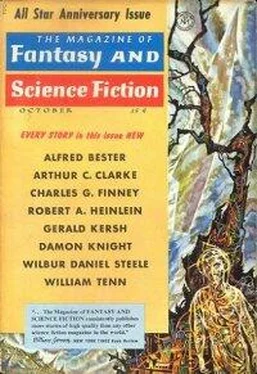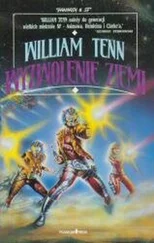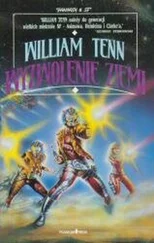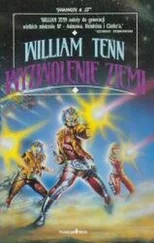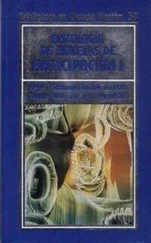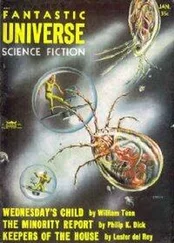William Tenn - Eastward Ho!
Здесь есть возможность читать онлайн «William Tenn - Eastward Ho!» весь текст электронной книги совершенно бесплатно (целиком полную версию без сокращений). В некоторых случаях можно слушать аудио, скачать через торрент в формате fb2 и присутствует краткое содержание. Год выпуска: 1958, Издательство: Mercury Press, Inc., Жанр: Фантастика и фэнтези, на английском языке. Описание произведения, (предисловие) а так же отзывы посетителей доступны на портале библиотеки ЛибКат.
- Название:Eastward Ho!
- Автор:
- Издательство:Mercury Press, Inc.
- Жанр:
- Год:1958
- ISBN:нет данных
- Рейтинг книги:3 / 5. Голосов: 1
-
Избранное:Добавить в избранное
- Отзывы:
-
Ваша оценка:
- 60
- 1
- 2
- 3
- 4
- 5
Eastward Ho!: краткое содержание, описание и аннотация
Предлагаем к чтению аннотацию, описание, краткое содержание или предисловие (зависит от того, что написал сам автор книги «Eastward Ho!»). Если вы не нашли необходимую информацию о книге — напишите в комментариях, мы постараемся отыскать её.
Eastward Ho! — читать онлайн бесплатно полную книгу (весь текст) целиком
Ниже представлен текст книги, разбитый по страницам. Система сохранения места последней прочитанной страницы, позволяет с удобством читать онлайн бесплатно книгу «Eastward Ho!», без необходимости каждый раз заново искать на чём Вы остановились. Поставьте закладку, и сможете в любой момент перейти на страницу, на которой закончили чтение.
Интервал:
Закладка:
Eastward Ho!
by William Tenn
The New Jersey Turnpike had been hard on the horses. South of New Brunswick the potholes had been so deep, the scattered boulders so plentiful, that the two men had been forced to move at a slow trot, to avoid crippling their three precious animals. And, of course, this far south, farms were nonexistent; they had been able to eat nothing but the dried provisions in the saddlebags, and last night they had slept in a roadside service station, suspending their hammocks between the tilted, rusty gas pumps.
But it was still the best, the most direct route, Jerry Franklin knew. The Turnpike was a government road: its rubble was cleared semiannually. They had made excellent time and come through without even developing a limp in the pack horse. As they swung out on the last lap, past the riven tree stump with the words TRENTON EXITcarved on its side, Jerry relaxed a bit. His father, his father’s colleagues, would be proud of him. And he was proud of himself.
But the next moment, he was alert again. He roweled his horse, moved up alongside his companion, a young man of his own age.
“Protocol,” he reminded. “I’m the leader here. You know better than to ride ahead of me this close to Trenton.”
He hated to pull rank. But facts were facts, and if a subordinate got above himself he was asking to be set down. After all, he was the son—and the oldest son, at that—of the Senator from Idaho; Sam Rutherford’s father was a mere Undersecretary of State and Sam’s mother’s family was pure post-office clerk all the way back.
Sam nodded apologetically and reined his horse back the proper couple of feet. “Thought I saw something odd,” he explained. “Looked like an advance party on the side of the road—and I could have sworn they were wearing buffalo robes.”
“Seminole don’t wear buffalo robes, Sammy. Don’t you remember your sophomore political science?”
“I never had any political science, Mr. Franklin: I was an engineering major. Digging around in ruins has always been my dish. But from the little I know, I didn’t think buffalo robes went with the Seminole. That’s why I was—”
“Concentrate on the pack horse,” Jerry advised. “Negotiations are my job.”
As he said this, he was unable to refrain from touching the pouch upon his breast with rippling fingertips. Inside it was his commission, carefully typed on one of the last precious sheets of official government stationery (and it was not one whit less official because the reverse side had been used years ago as a scribbled interoffice memo) and signed by the President himself. In ink!
The existence of such documents was important to a man in later life. He would have to hand it over, in all probability, during the conferences, but the commission to which it attested would be on file in the capital up north.
And when his father died, and he took over one of the two hallowed Idaho seats, it would give him enough stature to make an attempt at membership on the Appropriations Committee. Or, for that matter, why not go the whole hog—the Rules Committee itself? No Senator Franklin had ever been a member of the Rules Committee…
The two envoys knew they were on the outskirts of Trenton when they passed the first gangs of Jerseyites working to clear the road. Frightened faces glanced at them briefly, and quickly bent again to work. The gangs were working without any visible supervision. Evidently the Seminole felt that simple instructions were sufficient.
But as they rode into the blocks of neat ruins that were the city proper and still came across nobody more important than white men, another explanation began to occur to Jerry Franklin. This all had the look of a town still at war, but where were the combatants? Almost certainly on the other side of Trenton, defending the Delaware River—that was the direction from which the new rulers of Trenton might fear attack—not from the north where there was only the United States of America.
But if that were so, who in the world could they be defending against? Across the Delaware to the south there was nothing but more Seminole. Was it possible—was it possible that the Seminole had at last fallen to fighting among themselves?
Or was it possible that Sam Rutherford had been right? Fantastic. Buffalo robes in Trenton! There should be no buffalo robes closer than a hundred miles westward, in Harrisburg.
But when they turned onto State Street, Jerry bit his lip in chagrin. Sam had seen correctly, which made him one up.
Scattered over the wide lawn of the gutted state capitol were dozens of wigwams. And the tall, dark men who sat impassively, or strode proudly among the wigwams, all wore buffalo robes. There was no need even to associate the paint on their faces with a remembered lecture in political science: these were Sioux.
So the information that had come drifting up to the government about the identity of the invader was totally inaccurate—as usual. Well, you couldn’t expect communication miracles over this long a distance. But that inaccuracy made things difficult. It might invalidate his commission, for one thing: his commission was addressed directly to Osceola VII, Ruler of All the Seminoles. And if Sam Rutherford thought this gave him a right to preen himself—
He looked back dangerously. No, Sam would give no trouble. Sam knew better than to dare an I-told-you-so. At his leader’s look, the son of the Undersecretary of State dropped his eyes groundwards in immediate humility.
Satisfied, Jerry searched his memory for relevant data on recent political relationships with the Sioux. He couldn’t recall much—just the provisions of the last two or three treaties. It would have to do.
He drew up before an important-looking warrior and carefully dismounted. You might get away with talking to a Seminole while mounted, but not the Sioux. The Sioux were very tender on matters of protocol with white men.
“We come in peace,” he said to the warrior standing as impassively straight as the spear he held, as stiff and hard as the rifle on his back. “We come with a message of importance and many gifts to your chief. We come from New York, the home of our chief.” He thought a moment, then added: “You know, the Great White Father?”
Immediately, he was sorry for the addition. The warrior chuckled briefly; his eyes lit up with a lightning-stroke of mirth. Then his face was expressionless again, and serenely dignified as befitted a man who had counted coup many times.
“Yes,” he said. “I have heard of him. Who has not heard of the wealth and power and far dominions of the Great White Father? Come. I will take you to our chief. Walk behind me, white man.”
Jerry motioned Sam Rutherford to wait.
At the entrance to a large, expensively decorated tent, the Indian stood aside and casually indicated that Jerry should enter.
It was dim inside, but the illumination was rich enough to take Jerry’s breath away. Oil lamps! Three of them! These people lived well.
A century ago, before the whole world had gone smash in the last big war, his people had owned plenty of oil lamps themselves. Better than oil lamps, perhaps, if one could believe the stories the engineers told around the evening fires. Such stories were pleasant to hear, but they were glories of the distant past. Like the stories of overflowing granaries and chock-full supermarkets, they made you proud of the history of your people, but they did nothing for you now. They made your mouth water, but they didn’t feed you.
The Indians whose tribal organization had been the first to adjust to the new conditions, in the all-important present, the Indians had the granaries, the Indians had the oil lamps. And the Indians…
Читать дальшеИнтервал:
Закладка:
Похожие книги на «Eastward Ho!»
Представляем Вашему вниманию похожие книги на «Eastward Ho!» списком для выбора. Мы отобрали схожую по названию и смыслу литературу в надежде предоставить читателям больше вариантов отыскать новые, интересные, ещё непрочитанные произведения.
Обсуждение, отзывы о книге «Eastward Ho!» и просто собственные мнения читателей. Оставьте ваши комментарии, напишите, что Вы думаете о произведении, его смысле или главных героях. Укажите что конкретно понравилось, а что нет, и почему Вы так считаете.
